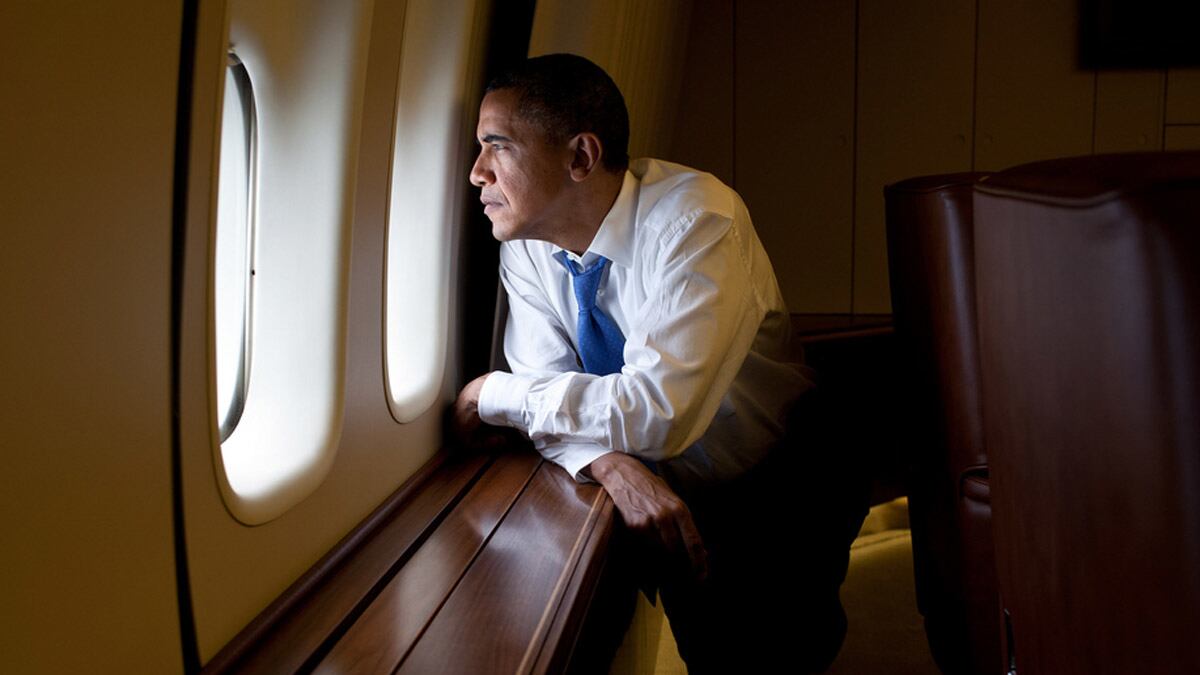In the new 17-minute campaign video, The Road We’ve Traveled, the documentarian Davis Guggenheim lays out the case for a second Obama term.
Without Obama, his film says, we would likely have plunged into a depression similar to the one the United States saw in the 1930s under Franklin Delano Roosevelt. The automobile industry probably would have collapsed. Some 3.5 million Americans might not have jobs. Osama bin Laden might not have been caught. We would, in all likelihood, still be fighting in Iraq.
The film, as Alessandra Stanley of The New York Times points out, “isn’t telling voters that everything is rosy after three years of the Obama presidency. Instead, it suggests that it could all have been so much worse.”
Nevertheless, because Guggenheim is an Academy Award–winning filmmaker responsible for directing two of the best-known documentaries of the last 10 years, agreeing to do a promotional vehicle for a politician—even one as generally well-liked in Hollywood as Obama—has produced a certain amount of consternation.
It’s been a brouhaha.
On Thursday, Guggenheim appeared on Piers Morgan Tonight, where the host seemed less than impressed with the guest’s unambiguous support for the president. “Are there any negatives in there?” Morgan asked. “Where do you find faults in him, personally?”
Guggenheim replied that he had no real issues with the president, that he mainly felt the guy had been saddled with a really tricky situation coming into office. As a director, he said, what was really difficult was cramming Obama’s achievements into 17 minutes (“The negatives for me were that there were too many accomplishments”).

Morgan nearly lost it.
“Oh, come on, you can’t say that with a straight face.”
On one level, the exchange was ludicrous (even as it put Morgan back into the news cycle). After all, Guggenheim did not set out to commit an act of journalism. He was paid several hundred thousand dollars by the president’s reelection team to do what amounts to a basically run-of-the-mill campaign video.
It’s also worth noting that documentary filmmakers have never really followed the same rules about objectivity as, say, newspaper reporters; there is a long tradition of auteurs moonlighting as promotions people. Albert Maysles directed Sports Illustrated: The Making of the Swimsuit Issue.
Hell, Leni Riefenstahl worked for Adolf Hitler on Triumph of the Will.
Over the weekend, I reached out to Fenton Bailey, a talented filmmaker who has made docs about everything from gay Republicans to the 1970s porn film Deep Throat.
He called the very idea of an objective documentary “old-fashioned.”
“I understand how that idea evolved,” he said, “but today, when there are so many ways of telling a story, it’s a very different environment. I happen to believe an audience is totally capable of weighing in the objectivity or subjectivity of the filmmaker. I think the audience doesn’t really get confused and is able to see through things.”
I respect Bailey’s view on this, but I think he pushes the argument a bit too far.
If something is billed as nonfiction and appears to comport with the truth, it doesn’t really matter to audiences whether or not you call it journalism.
This was the problem Mike Daisey ran into last week, when it turned out that many of the stories he told in his much-lauded show The Agony and Ecstasy of Steve Jobs were fabricated.
After the show played to sold-out audiences for months and got rave reviews, it turned out Daisey had made up a number of major stories and presented them as fact even when speaking to journalists or appearing on television talking about Apple.
Daisey insisted that he should not be held to the same standards as people like me, that he was not a member of the press, yada yada yada.
But the argument doesn’t really make sense.
The fact is, lots of people believed his stories about armed guards working at Apple’s factories. There was no indication they might not be true.
People believed Daisey when he said he met a man who was fired from his job after his hands were mangled in a metal press. There was no indication it might not be true.
Partly as a result of these stories, Daisey's platform grew. He became an expert on all things Apple in the media and repeated these stories as if they were more than just a part of his theater piece. He was given space on the op-ed page of The New York Times.
We are in a bad moment where it comes to the divide between fact and fiction, journalism and promotion, information and entertainment.
So where does this leave Guggenheim, whose “crime,” as it were, is being co-opted by the Obama administration? For sure, it’s less egregious than Daisey. But it may also be less surprising.
And that’s not a compliment.
In his best-known films, Guggenheim has gotten a little close to his sources, whether it’s Al Gore in An Inconvenient Truth (a film about global warming) or Michelle Rhee and Geoffrey Canada in Waiting for “Superman” (about the education crisis in America).
There, what starts out as a series of really personal stories about parents, children, and teachers flailing around the public school system devolves into an infomercial for charter schools. As Dana Goldstein, an education writer and Schwartz fellow at the New America Foundation, puts it: “Waiting for ‘Superman’ vastly oversimplified the debate over charter schools, depicting them as the only schools that effectively serve low-income children, which we know is not true. And the film, in its eagerness to paint teachers’ unions as villains, ignored the fact that some high-performing charter schools, like the Green Dot schools, are unionized.”
If there’s one good thing about the Obama documentary, it’s that it’s never unclear whose side it’s on. It’s a campaign video, plain and clear. And chances are, few who watch it will really know that it was made by the same man who won an Oscar just a few years back. Still, it won’t help him as an artist. And he could certainly use a journalism seminar.






